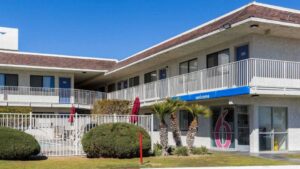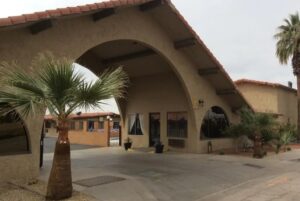After Renovation, Berkeley’s Hotel Durant Keeps Quirky Charm
After Renovation, Berkeley’s Hotel Durant Keeps Quirky Charm
San Francisco Chronicle
03/22/17
After Renovation, Berkeley’s Hotel Durant Keeps Quirky Charm
By Kathleen Pender
It’s not often that you walk into an old hotel under renovation and can’t tell what’s new and what’s not. That’s by design at Berkeley’s Hotel Durant, which has been taken over and remodeled by Graduate Hotels, a Chicago chain that specializes in college towns.
Ben Weprin, the chain’s 38-year-old founder, said he wants to create a sense of “vuja de” at the 1928 hotel. Vuja de is what happens when you go somewhere you’ve been many times and it feels eerily new. It’s the opposite of deja vu, which happens when a new experience feels weirdly familiar.
In Henry’s, the hotel’s popular restaurant and bar, the maple floor has been refinished but the ornate oak bar and pine walls remain. Los Angeles restauranteur Bill Chait, a Cal alum, and Carl Shuster are taking over Henry’s food and beverage service, Weprin said. He is also talking to the Tartine Group about opening a bakery or cafe in a space on Durant Avenue formerly used as a meeting room.
In Henry’s men’s room, a urinal in cardinal red with a Stanford logo is replacing the old one, which will be auctioned off to benefit a women’s charity, Weprin said. The swinging door to Henry’s kitchen still has patched-over bullet holes, a reminder of the 1990 hostage crisis that left one student and the gunman dead.
The hotel’s sunny dining room that faces Durant has been completely renovated, in an old-meets-new-world style. The modern wallpaper, upon close inspection, is made of newspaper clippings. A vintage “Cal’s Liquors” sign looks like it’s been there forever. In fact, Weprin picked it up for about $500 from a defunct tavern in Chicago’s South Loop — then paid four times that to ship it to Berkeley.
Weprin wants it to look like “Indiana Jones’ pied-a-terre,” he said. “It should feel like it has evolved over time, we didn’t pick the rooms out of a catalog.”
No chance of that. The rooms still have bong lamps, a feature since 2008.
The hotel, a block from the UC Berkeley campus, was named after Henry Durant, the University of California’s first president. The guest rooms are finished and open for business; the lobby, Henry’s and other common areas will be finished in mid-April.
Graduate Hotels, created in 2014, is a division of AJ Capital Partners, a real estate investment company in Chicago. The initials stand for Adventurous Journeys. Weprin founded the company in the fourth quarter of 2008, a good time to start picking up real estate. It has converted historic buildings, such as the Chicago Athletic Association club, into hotels and built some from scratch. It owns the Calistoga Ranch in Napa Valley with Auberge Resorts.
“AJ is a very aggressive, active growing hotel company,” said Chris Kraus, a managing director in the San Francisco office of consulting firm CBRE Hotels. “Berkeley is a really strategic acquisition for them” because it’s in a thriving education, research and tourist market.
AJ Capital has about 50 investors including some pension funds, but no universities, Weprin said.
Graduate Hotels builds or renovates lodging in college towns (primarily those with Division 1 football teams). It has hotels in Ann Arbor, Mich.; Oxford Miss.; Charlottesville, Va.; Madison, Wisc.; Tempe, Ariz.; and Athens, Ga. In the works are hotels in Minneapolis; Seattle; Bloomington, Ind.; Lincoln, Neb.; and Roosevelt Island, N.Y., home of the new Cornell Tech campus. Graduate is snooping around Stanford University.
Why this niche? Because college towns “lack cyclicality,” Weprin said. When the economy turns south, college enrollment typically picks up. College towns also have “spectacular demographics,” he added.
The only problem is that “it’s hard to find hotels to buy. Nobody has to sell.”
Graduate bought the 143-room Durant in September 2015 for $47.5 million, or about $332,000 per room. In 2016, the median price paid for hotels was $389,000 per room in San Francisco and $134,000 in Alameda County, according to Alan Reay, president of Atlas Hospitality Group in Irvine.
The price Graduate paid “was probably at high end for Alameda County, especially when you look at the money they had to spend on renovation. But downtown Berkeley has huge barriers to entry. I don’t know if anyone will get a hotel built in downtown Berkeley again,” Reay said. “Hats off to this company, they figured out how to work with the city.”
Graduate bought the hotel from Gemstone Hotels and Elliott Management Co., which acquired it from the Royal Bank of Scotland in December 2012 for $27.2 million, Reay said. The bank foreclosed on the hotel in January 2012 after Joie de Vivre Hotels — which purchased the Durant for $14 million in 2007 and got a $31 million renovation loan in 2008 — defaulted on the loan, he added.
Gemstone did a “soft renovation” on the Durant and added air conditioning, said Dell Dellinger, the hotel’s general manager since July 2014.
Graduate hopes to achieve an average room rate of $225 a night this year and an average occupancy percentage in the mid- to high 80s. That’s in line with the typical hotel in the Bay Area, which had an average daily rate of $230 last year and an occupancy rate of 84 percent, Reay said.
Reay doesn’t know any other companies targeting this niche, maybe because they’re afraid of a summer slowdown. But Weprin said the Durant does well year-round, thanks to extension and summer programs.
Weprin said he is asked often about Airbnb but does not see it as a threat.
Every hotel market in California except Bakersfield had positive growth in revenue per available room last year, Reay said. The average growth rate between 2015 and 2016 was 4.9 percent statewide compared to 2.3 percent nationally. The markets most challenged by Airbnb are probably not college towns, but high-end resort areas, where you may need multiple rooms, he added.
At Graduate properties, you won’t see any pennants or hallways painted in the school colors (Berkeley’s are Kelly green). The only place you will see Cal’s colors is on a 35-foot-long bookcase behind the reception desk that holds 8,500 National Geographic magazines dating back to the early 1900s. Their spines are the same shade as Cal gold.
The card keys at each Graduate hotel look like student ID cards of famous alumni. In Berkeley, they include Rube Goldberg, Gregory Peck and retired astronaut Margaret Rhea Seddon. The rooms are decorated with posters from “The Graduate” and artwork evoking alumni such as costume designer Edith Head.
The company commissioned a large pop-art portrait of former Cal and NFL running back Marshawn Lynch, surrounded by his beloved Skittles and sporting a gold mouth grille that says “Beast Mode.” The painting is by New Orleans artist Ashley Longshore, no relation to former Cal quarterback Nate Longshore, who was a teammate of Lynch.


